高中英语Unit2Whatishappinesstoyou英美文化欣赏教案含解析牛津译林版选修6
- 格式:doc
- 大小:841.00 KB
- 文档页数:5
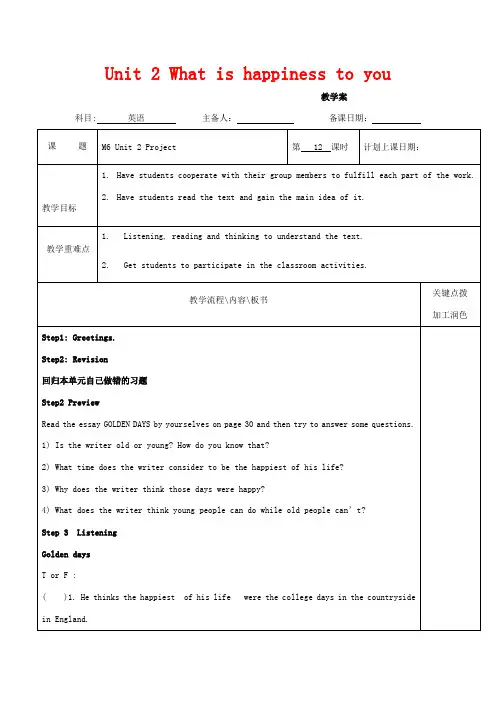
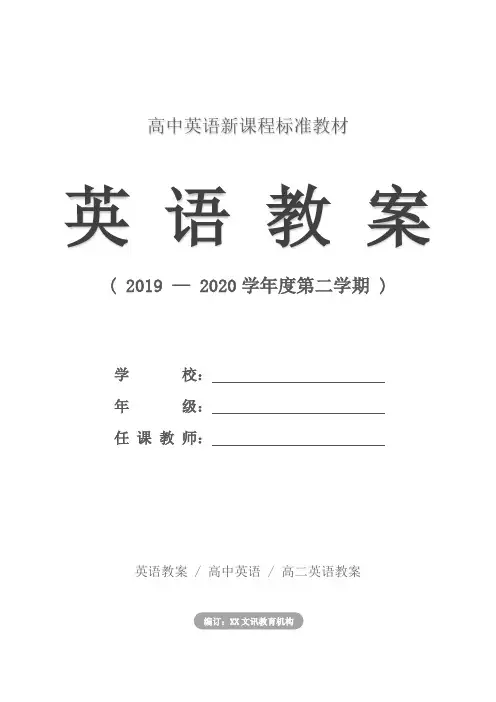
高中英语新课程标准教材英语教案( 2019 — 2020学年度第二学期 )学校:年级:任课教师:英语教案 / 高中英语 / 高二英语教案编订:XX文讯教育机构What is happiness to you(教案)教材简介:本教材主要用途为通过学习英语的内容,提高学生的语言技能,增加一项语言能力,有利于国际化的日常交流、生活、工作等,本教学设计资料适用于高中高二英语科目, 学习后学生能得到全面的发展和提高。
本内容是按照教材的内容进行的编写,可以放心修改调整或直接进行教学使用。
m6u2 what is happiness to you?reading1.the search for happiness1) 名词in search of/ in one’s search for搜寻2) 动词 vt. search sb./sp.(for sth)搜身,搜查某地 vi. search for 寻找the policeman _searched___ the thief and found several mobile phones.to my delight, most of you agree to search _for happiness in study.they __searched___ all the room ___for__ the missing papers.these birds fly south __in__ ____search___ __of__winter sun every year.= these birds fly south __in__ their __ __search___ __for__winter sun every year.2. happiness means achieving success in something, such as meeting a goal, 1)目的,目标 achieve/reach/realize/meet one’s goal _____ ;2)(球戏等的)得分,赢分 score a goal ____3)mean的用法 _mean to do___; ___mean doing___eg. i’m sorry to have wronged you, but really i didn’t mean __to hurt___(hurt) you.our teacher’s smile meant __allowing__(allow) us to go swimming.4)复习“成功做某事”our teacher has achieved success in teaching english.= our teacher __has__ _succeeded_ _in__ teaching english.=our teacher ___is__ __successful___ __in___ teaching english.=our teacher has taught english __successfully__.= our teacher __has _ _managed _ __to__teach english.3. to those who have been injured or struggle with a physical disability, …1) injure 伤害,损伤(主要指在事故中受伤); 损害,伤害(自尊,名誉等)he was badly injured in the car accident. ____i injured his pride. _______wound 主要是指战场上,由武器造成的伤害。
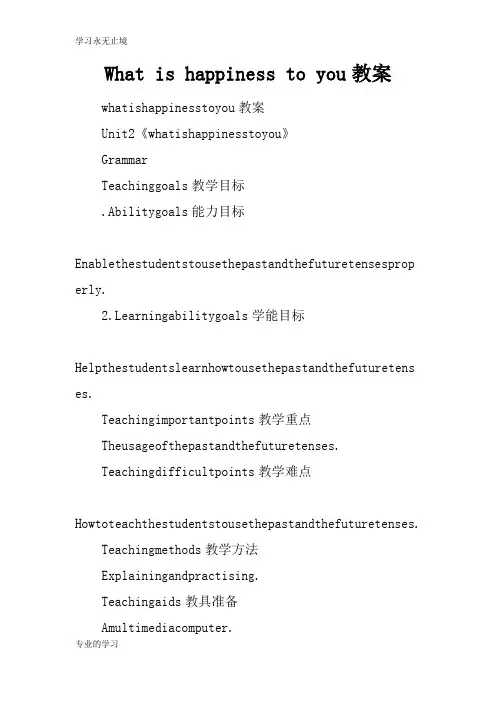
What is happiness to you教案whatishappinesstoyou教案Unit2《whatishappinesstoyou》GrammarTeachinggoals教学目标.Abilitygoals能力目标Enablethestudentstousethepastandthefuturetensesprop erly.2.Learningabilitygoals学能目标Helpthestudentslearnhowtousethepastandthefuturetens es.Teachingimportantpoints教学重点Theusageofthepastandthefuturetenses.Teachingdifficultpoints教学难点Howtoteachthestudentstousethepastandthefuturetenses.Teachingmethods教学方法Explainingandpractising.Teachingaids教具准备Amultimediacomputer.Teachingprocedures&ways教学过程与方式StepⅠRevisionT:yesterday,welearnedsomewordsandalsosomeEnglishidi omsaboutemotions.Let’shavearevision.TrytoexplaintheminEnglish.Thefirston e:hotunderthecollar?S:Theidiommeansthatsomebodyisveryangry.T:Doyouagree?Ss:yes.T:Nextone:downinthedumps?S:Letmehaveatry.Theidiomexpressedthefeelingofsadnes s.T:youareright.Thelastone:oncloudnine?S:Thatmeanssomeoneisveryhappy.T:correct!youallhavedoneagoodrevision.StepⅡPresentationShowstudentsthefollowingsentences,andaskthemtospeak outthedifference..HewenttoParistwoyearsago.2.HewillgotoParisnextyear.T:Pleaselookatthetwosentences.canyoutellthedifferen cebetweenthem?S:Thefirstsentencetalksaboutsomethingthathappenedin thepastandthesecondsentencetalksaboutsomethingthath appensinthefuture.T:Exactly!StepⅢExplanationGetthestudentstotalkaboutthedifferentformsofthepast tenseandthefuturetense.T:wehavelearnedwhatthepasttenseisandwhatthefuturete nseis.Therearemanyformsofeachtense.Let’sdealwiththepasttensefirst.Pleaselookatthefollowing sentences.Showstudentsthefollowingsentences..SangLanwasborninNingbo,chinain1981.2.Sheknewthatinthoseyearsshewasmakingherparentsprou3.Insteadofcryingaboutwhatshehadlost,SangLanthought aboutwhatshecoulddotogetbetter.4.BythetimeshecompetedintheNewyorkGoodwillGames,she hadbeenadedicatedjuniorgymnastforelevenyears.T:First,lookatthefoursentences.Dotheyhavesomethingi ncommon?S:yes!Theyallusethepasttense.T:Buttherearealsodifferencesamongthem.canyoutellthe differences?Next,discusswithyourpartners.Payattenti ontotheitalicwords.Severalminuteslater.T:canyoushowyouropinionsnow?Ss:yes.S:Inthefirstsentenceweusethesimplepasttensetotalkab outsomethinghappenedinthepast.T:Verygood.whataboutthesecondsentence?S:Ithinkitmeanssomethinghappenedinthepastandcontinu edforsometime.T:Verygood!Thankyou!Nowlet’smovetothelasttwosentences.S:Theyarebothusedinthepastperfecttense.Bylookingatt hetwosentences,Ithinkweusethepastperfecttensetotalk aboutthingsthathappenedinthepastandstoppedbeforeano therpastactionbegan.T:Excellent!ButIthinkyouarepartlyright.Dothetwosent encesexpressthesamemeaning?S:Thefourthsentencemeansthethinghappenedinthepastan datthattimeanotherpastactionbegan.T:That’sit!justnowwetalkedaboutdifferentformsofthepasttens e.Andlater,wewilldomorepracticeaboutthem.Nowlet’smovetothefuturetense.Pleaselookatthefollowingsente nces.canyoutellthedifference?Showstudentsthefollowingsentences:.Shewillcomewithustowatchthefootballmatchtomorr ow.2.Ishallworkhardandlearntobecomeagymnast.3.Today,I’mgoingtotalkabouthowtofindhappiness.4.DrBrainwillbetalkingaboutsuccessnexttime.5.BeforeshewenttotheGoodwillGames,SangLantoldherpar entsshewasgoingtowinherevent.SeveralminuteslaterT:Areyoureadytoshowmeyouranswers?Ss:yes!S:Iwillhaveatry.Insentences1,2,3thesimplefuturetenseisused.whenthesubjectisthefirst person,weusuallyuseshallinsteadofwill.T:youareright.Thenwhenshallweuse“begoingto”?S:Ithinkwhenwewanttotalkaboutfutureplansandintentio ns,wecanuse“begoingto”.T:Verygood.yougottheanswer.whataboutsentence4?S:Sentence4usesthefuturecontinuoustense.Thissentenc eisusedtotalkaboutsomethingthatwillstartinthefuture andcontinueforsometime.T:Excellent!Thefifthsentenceisusedinthefutureinthep ast.whenshallweusethistense?S:whenwewanttotalkaboutaneventwhichwasinthefutureat thetimewhenitwasdiscussed.T:yougottheanswer.Goodjob!NextI’llshowyoufurtherexplanationsaboutfuturetense.Showthefollowingtothestudentsandaskthemtotakesomeno tes..will/shalldo表示纯粹的将来或临时做出的决定,也可表示一种必然的趋势。
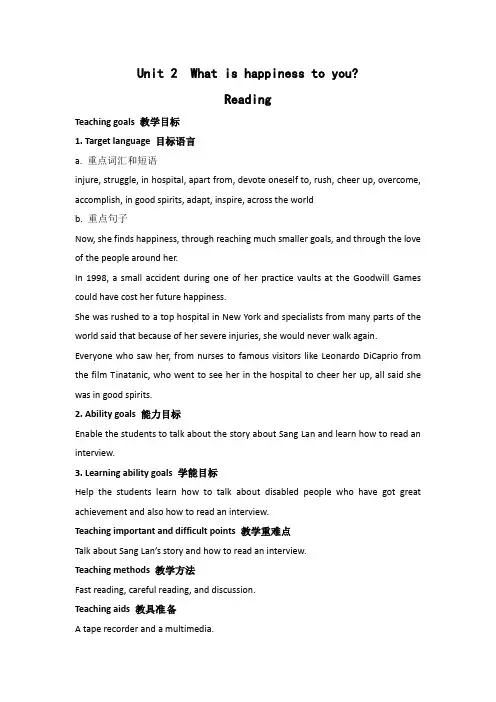
Unit 2 What is happiness to you?ReadingTeaching goals 教学目标1. Target language 目标语言a. 重点词汇和短语injure, struggle, in hospital, apart from, devote oneself to, rush, cheer up, overcome, accomplish, in good spirits, adapt, inspire, across the worldb. 重点句子Now, she finds happiness, through reaching much smaller goals, and through the love of the people around her.In 1998, a small accident during one of her practice vaults at the Goodwill Games could have cost her future happiness.She was rushed to a top hospital in New York and specialists from many parts of the world said that because of her severe injuries, she would never walk again. Everyone who saw her, from nurses to famous visitors like Leonardo DiCaprio from the film Tinatanic, who went to see her in the hospital to cheer her up, all said she was in good spirits.2. Ability goals 能力目标Enable the students to talk about the story about Sang Lan and learn how to read an interview.3. Learning ability goals 学能目标Help the students learn how to talk about disabled people who have got great achievement and also how to read an interview.Teaching important and difficult points 教学重难点Talk about Sang Lan’s story and how to read an interview.Teaching methods 教学方法Fast reading, careful reading, and discussion.Teaching aids 教具准备A tape recorder and a multimedia.Teaching procedures and ways 教学过程与方式Step ⅠGreetings and Lead-inGreet the students as usual and get them to review what they have talked about in the last period.T: Do you remember what we talked about last time?Ss: Yes. We talked about happiness and how to become happy by discussing six pictures.T: Yes, that’s it. Usually, we become unhappy because of this or that, and can cheer up again with the help of our friends or parents. But have you ever thought about the disabled?S: They suffer a lot both physically and mentally.S: I think it is very difficult for them to do things.S: We should help them.…T: Quite right! However, there are many disabled people, who defeated unexpected difficulties and succeeded finally and set good examples to us. Can you give me some examples?S: Sima Qian in western Han Dynasty composed Shih Chi.S: Sun Zi, whose feet were cut, wrote the Art of War.S: Hellen Keller, who lost eyesight and hearing, entered Harvard and Cambridge to study and became a great writer and educator.…T: Well done! All these people encourage us so much. And if you suffered from what they had experienced, what would you do?S: I would push for success.S: I would do something I can to make my life colourful.S: I wanted to learn something.S: I would do something to help others. I always believe helping others can make ushappy.T: Great! All of you hold positive attitudes towards this. And today we will read an interview. The main character in the interview is Sang Lan. Do you know anything about her?S: I know she was once a gymnast.T: Yes, what’s more?S: She had an accident during one of her practice vaults and got injured severely.T: That is a shock to everyone. How did she overcome the difficulties, and how is she now? Let’s move to the text.Step ⅡFast-readingGet the students to read the text quickly and find out the answers to the questions in Part A.T: Now go through the text quickly, and answer the questions in Part A.A few minutes later.T: Now who would like to answer the questions?S: The topic of the TV interview is about the search for happiness.T: That’s right. Next question: What’s the name of the psychologist?S: The psychologist’s name is Dr. Brain.T: Good. The last question: When and where was Sang Lan born?S: She was born in Ningbo, China in 1981.Step ⅢCareful-readingGet the students to read the text carefully and learn more detailed information and then do Exercise C.T: You have done a very good job in answering the three questions. And now I will give you some more minutes to read the text carefully. Then try to do True or False questions in C1 on Page 20. If the statement is wrong, please try to correct it. Several minutes later, check the answers together.T: Excellent! You have done a very good job.Step ⅣPost-readingGet the students to do Exercises C2, D, E and F.T: Now you have got a better understanding of the text. Next, let’s do some exercises. First, ask the students to glance at Exercise C2 and D, the read Reading part again to finish them.Several minutes later. Check the answers together.T: Well done! Now let’s look at Exercise E. This is a newspaper article about Sang Lan.I will give you several minutes to complete the article.Several minutes later.T: Shall we check the answers now? I will ask some of you to read the article first. Ask some students to read the article and check the answers together.T: Well done! Next let’s talk about Exercise F in pairs, and la ter I’ll ask some of you to show us your dialogue. Are you clear?Ss: Yes!Give the students enough time to do that. Then check the answers.Sample dialogue:A: Have you ever heard about the story of Sang Lan?B: Yes, of course! She is very famous in gymnastics, which is a dangerous sport, only top athletes should be allowed to try the most difficult moves.A: Why do you think so?B: Because these athletes, who could be chosen to take part in the inter national games, must be talents in this field. They are trained professionally and practice almost day and night, bearing tiredness, hardship, and other things that we have never thought about.A: I do think so. But I also think that even though we can not be the top athletes in the world, training hard at a sport can make us more hard-working in other areas of our life.B: I can’t agree more. Training hard at a sport not only helps us build up our determination, challenge various difficulties bravely, and also helps us learn to collaborate with other team members.A: Yes. From the story of Sang Lan, we can find that the sport spirit can help her hold a positive attitude towards her life and the world.B: So, she keeps busy and thin ks about positive things to enrich her life.A: By doing so, she will think little about herself and more about others. When she recalls all these meaningful things she has done, she’ll be very happy.B: Quite right!Step V DiscussionEnable the students to talk about their experiences to overcome the difficulties and become happy.T: Up to now, we have learned the story about Sang Lan and her struggle for happiness. And what can we learn from her? Next, combine your own experience and discuss the questions with your partners. I will give you some minutes to finish the task.Show the students the following questions.1. Have you ever had some painful experiences?2. If you have, how did you search for your happiness?Give the students some time to discuss the questions in groups of four.During this period, the teacher may go into the students to give them help if necessary. After several minutes, check the answers.T: Well, time is up. Have you finished the discussion?Ss: Yes.T: OK. I’ll ask some of you to tell your stories.S: When I was twelve years old, I had a bad accident. I was knocked over by a car. After two months of treatment, I was nearly recovered. But I couldn’t stand up easily. So I had to sit in the wheelchair. It was a shock to me. I was so afraid tobecome disabled. During that period of time, I felt very frustrated. Fortunately, my parents and my friends gave me much encouragement. They spared every free minute to stay with me and help me do exercise. Because of their encouragement and help, I cheered up again. I was determined to stand up again. Now I am as healthy as the others. After that experience, I realised that be optimistic, and everything will become better.T: Very good. You are brave. I believe in the future nothing will stop you. You will have a bright future.S2: To me, the most painful experience was the first month in the school. My home is far from here, so I had to be in residence(住校). I could meet my parents once a week. I felt so lonely. Everything was new to me. In that month, my study fell behind sharply. However, I thought, I couldn’t be like that any more. My aim was to get further education, not to miss my parents. So I concentrated on study. In my spare time, I tried to tal k with my classmates and made friends with them.Everything became better an d better afterwards.S: The painful experience I had was my failure in one exam. I had never failed in any exams before. That time I felt frustrated and even lost heart in my study. After a talk with my teacher, I realized: No pains, no gains. I looked back upon my attitude towards study before. Even the easiest things will become hard for you if you don’t try. So now I try my best to do everything. The results turn out that my effort is not in vain. I feel satisfied and happy.T: Good! You have expressed yourselves very clearly.Step ⅥText analysisHelp the students learn something about interview.T: The text we learned today is an interview. Can you tell me how to read an interview?S: First I will get the topic of the interview. And then I will read the questions and answers carefully.T: Good! Let’s read a reading strategy to know how to read an interview. Please open your books to Page 19.After several minutes.T: Can you tell me what an interview is?S: An interview takes place when one pe rson asks another person a series of questions on a topic.T: When reading an interview, what is important for us to do?S: It is important to carefully scan the first paragraph to find out the topic of the interview.T: What should we do after that?S: Then we should carefully read each question and try to fully understand the question before reading the interviewee’s response.T: If we want to get a better understanding of the topic, what should we do?S: We should pay special attention to the answer to the question.T: Thank you, very good. In this class, we learned Sang Lan’s search for happiness and we also learned how to read an interview. Everyone did a very good job. Class is over.Step ⅦHomework1. Remember the new words and expressions.2. Retell the text.。
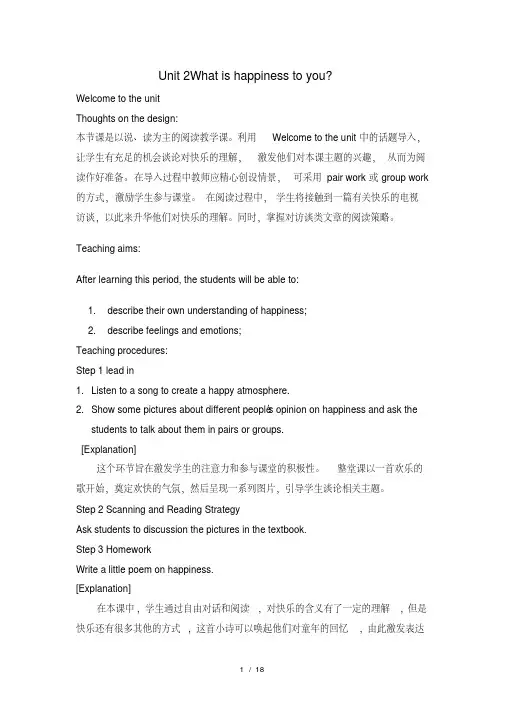
Unit 2What is happiness to you?Welcome to the unitThoughts on the design:本节课是以说、读为主的阅读教学课。
利用Welcome to the unit 中的话题导入,让学生有充足的机会谈论对快乐的理解,激发他们对本课主题的兴趣,从而为阅读作好准备。
在导入过程中教师应精心创设情景,可采用pair work或group work 的方式,激励学生参与课堂。
在阅读过程中,学生将接触到一篇有关快乐的电视访谈,以此来升华他们对快乐的理解。
同时,掌握对访谈类文章的阅读策略。
Teaching aims:After learning this period, the students will be able to:1.describe their own understanding of happiness;2.describe feelings and emotions;Teaching procedures:Step 1 lead in1.Listen to a song to create a happy atmosphere.2.Show some pictures about different people’s opinion on happiness and ask thestudents to talk about them in pairs or groups.[Explanation]这个环节旨在激发学生的注意力和参与课堂的积极性。
整堂课以一首欢乐的歌开始,奠定欢快的气氛,然后呈现一系列图片,引导学生谈论相关主题。
Step 2 Scanning and Reading StrategyAsk students to discussion the pictures in the textbook.Step 3 HomeworkWrite a little poem on happiness.[Explanation]在本课中, 学生通过自由对话和阅读, 对快乐的含义有了一定的理解, 但是快乐还有很多其他的方式, 这首小诗可以唤起他们对童年的回忆, 由此激发表达内心想法的欲望。
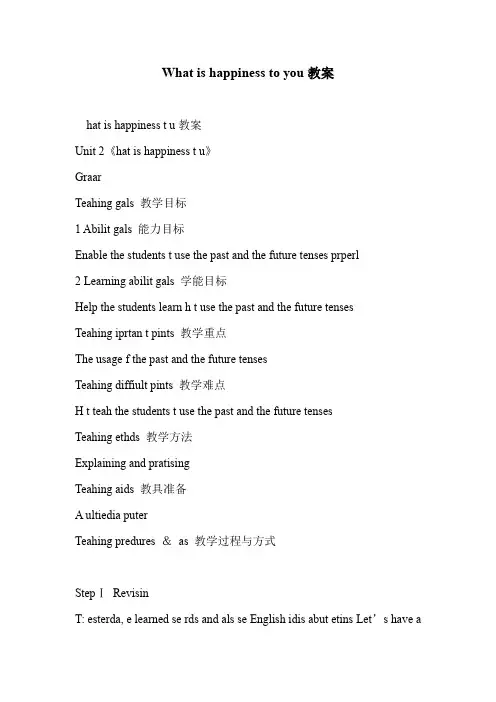
What is happiness to you教案hat is happiness t u教案Unit 2《hat is happiness t u》GraarTeahing gals 教学目标1 Abilit gals 能力目标Enable the students t use the past and the future tenses prperl2 Learning abilit gals 学能目标Help the students learn h t use the past and the future tensesTeahing iprtan t pints 教学重点The usage f the past and the future tensesTeahing diffiult pints 教学难点H t teah the students t use the past and the future tensesTeahing ethds 教学方法Explaining and pratisingTeahing aids 教具准备A ultiedia puterTeahing predures &as 教学过程与方式StepⅠRevisinT: esterda, e learned se rds and als se English idis abut etins Let’s have arevisin Tr t explain the in English The first ne: ht under the llar?S: The idi eans that sebd is ver angrT: D u a gree?Ss: esT: Next ne: dn in the dups?S: Let e have a tr The idi expressed the feeling f sadnessT: u are right The last ne: n lud nine?S: That eans sene is ver happT: rret!u all have dne a gd revisinStepⅡPresentatinSh students the flling sentenes, and as the t spea ut the differene1 He ent t Paris t ears ag2 He ill g t Paris next earT: Please l at the t sentenes an u tell the differene beteen the?S: The first sentene tals abut sething that happened in the past and the send sentene tals abut sething that happens in the futureT: Exatl!Step ⅢExplanatinGet the students t tal abut the different frs f the past tense and the future tenseT: e have learned hat the past tense is and hat the future tense is There are an frs f eah tense Let’s deal ith the past tense first Please l at the flling sentenesSh students the flling sentenes1 Sang Lan as brn in Ningb, hina in 19812 She ne that in thse ears she as aing her parents prud3 Instead f ring abut hat she had lst, Sang Lan thught abut hat she uld d t get better4 B the tie she peted in the Ne r Gdill Gaes, she had been a dediated unir gnast fr eleven earsT: First, l at the fur sentenes D the have sething in n?S: es! The all use the past tenseT: But there are als differenes ang the an u tell the differenes? Next, disuss ith ur partners Pa attentin t the itali rdsSeveral inutes laterT: an u sh ur pinins n?Ss: esS: In the first sentene e use the siple past tense t tal abut sething happened in the pastT: Ver gd hat abut the send sentene?S: I thin it eans sething happened in the past and ntinued fr se tieT: Ver gd! Than u! N let’s ve t the last t sentenesS: The are bth used in the past perfet tense B ling at the t sentenes, I thin e u se the past per fet tense t tal abut things that happened in the past and stpped befre anther past atin beganT: Exellent! But I thin u are partl right D the t sentenes express the sae eaning?S: The furth sentene eans the thing happened in the past and at that tie anther past atin beganT: That’s it! ust n e taled abut different frs f the past tense And later, e ill d re pratie abut the N let’s ve t the future tense Please l at the flling sentenes an u tell the differene?Sh students the flling sentenes:1 She ill e ith us t ath the ftball ath trr2 I shall r hard and learn t bee a gnast3 Tda, I’ging t tal abut h t find happiness4 Dr Brain ill be taling abut suess next tieBefre she ent t the Gdill Gaes, Sang Lan tld her parents she as ging t in her eventSeveral inutes laterT: Are u read t sh e ur ansers?Ss: es!S: I ill have a tr In sentenes1, 2, 3 the siple future tense is used hen the subet is the first persn, e usuall use shall instead f illT: u are ri ght Then hen shall e use “be ging t”?S: I thin hen e ant t tal abut future plans and intentins, e an use “be ging t”T: Ver gd u gt the anser hat abut sentene 4?S: Sentene 4 uses the future ntinuus tense This sentene is used t tal abut sething that ill start in the future and ntinue fr se tieT: Exellent! The fifth sentene is used in the future in the past hen shall e use this tense?S: hen e ant t tal abut an event hih as in the future at the tie hen it as disussedT: u gt the anser Gd b! Next I’ll sh u further explanatins abut future tense Sh the flling t the students and as the t tae se ntes1 ill / shall d 表示纯粹的将或临时做出的决定,也可表示一种必然的趋势。
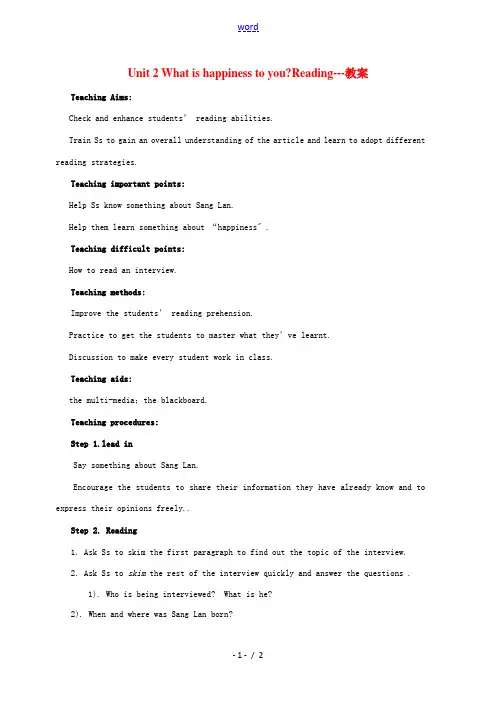
Unit 2 What is happiness to you?Reading---教案Teaching Aims:Check and enhance students’ reading abilities.Train Ss to gain an overall understanding of the article and learn to adopt different reading strategies.Teaching important points:Help Ss know something about Sang Lan.Help them learn something about “happiness〞.Teaching difficult points:How to read an interview.Teaching methods:Improve the students’ reading prehension.Practice to get the students to master what they’ve learnt.Discussion to make every student work in class.Teaching aids:the multi-media;the blackboard.Teaching procedures:Step 1.lead inSay something about Sang Lan.Encourage the students to share their information they have already know and to express their opinions freely..Step 2. Reading1. Ask Ss to skim the first paragraph to find out the topic of the interview.2. Ask Ss to skim the rest of the interview quickly and answer the questions .1). Who is being interviewed? What is he?2). When and where was Sang Lan born?3. Ask Ss to read the interview for the detailed information1).Why did Dr Brown use Sang Lan as an example ?2).What does Dr Brown really mean by saying “ she had a dedicated junior gymnast for eleven years〞?3). How does Sang Lan find happiness now?4). What was Sang Lan’s best event?5). What did his Sang Lan’s teammates think of her ?6). When and where did Sang Lan hurt herself? And how did she get hurt?7). Was she sad when staying in hospital?8). How did people who went to see her find her?4. Organize them into groups of four and have a petition.5. Get Ss to say something about Sang lan .6. Get Ss to finish E on page 217.Get Ss to discuss two questions.Step 3. Homework..Invent another situation that fits different emotions:。
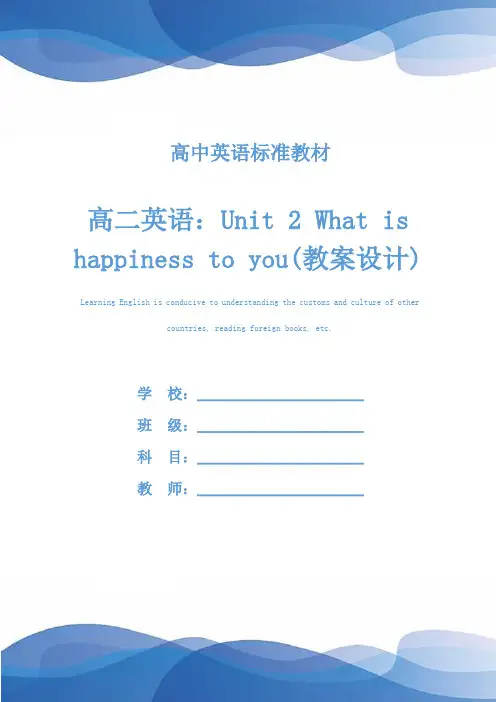
高中英语标准教材高二英语:Unit 2 What is happiness to you(教案设计)Learning English is conducive to understanding the customs and culture of othercountries, reading foreign books, etc.学校:______________________班级:______________________科目:______________________教师:______________________--- 专业教学设计系列下载即可用 ---高二英语:Unit 2 What is happiness toyou(教案设计)what is happiness to youunit 2 what is happiness to you?ⅰ.单元教学目标技能目标skill goals▲ read an interview and two essays about happiness▲ listen to a friend talk about problems and solutions ▲ talk about the gymnast sang lan▲ write an article for a website offering advice▲ create a happiness handbookⅱ.目标语言功能句型how to do an interviewour guest today is ...i understand that ...can you tell us a little bit about ...? talking about emotioni feel like ...they make / it makes me feel ...i wish ...i’m tired of ...asking for advicehow can i help him?do you think there is a solution?is there a way to make everyone happy? is there a solution he has not tried? why does this work?词汇1.四会词汇injure, struggle, disability, simply, psychologist, gymnast, gymnastics, junior, tournament, event, energetic, apart, devote, rush, specialist, severe, cheer, hopeless, overcome, injure, obey, disappointment, accomplish, adapt, journalism, disabled, positive, optimistic, inspire, courage, admirable, rebuild, un bearable, unfortunate, sympathy, admiration, star, arrange, coach, allocate, adequate, confused, whichever, quit, unhappy, encouragement, guidance, golden, rush, independent, worry, innocent, income, adolescence, accomplishment, vivid, hunger, communicate, guarantee, workday, assist, automatic, instant, maximum, company, minimum, mature, secure, motivation2.认读词汇dedicated, vault3.词组in hospital, apart from, devote oneself to, cheer up, in good spirits, across the world, role model, believe in, be tired of, ahead of, at that point, in a rush4.重点词汇injure, devote, rush, overcome, accomplish, adapt, arrange, guarantee, communicate, assist, whichever, confused, company语法the past tensethe simple past tensethe past continuous tensethe past perfect tensethe future tensethe simple future tensethe future continuous tensethe future in the past重点句子1. to those who have been injured or struggle with a physical disability, happiness can simply mean a day without pain or just being alive. p182. while she was injured and in hospital, the world was amazed by the way she remained cheerful. p183. now, she finds happiness through reaching much smaller goals, and through the love of the people around her. p184. in case some of our viewers don’t know her story, can you tell us a little bit about sang lan and who she is? p185. by the time she competed in the gymnastics tournament at the new york goodwill games, she had been a dedicated junior gymnast for eleven years. p186. even though her training meant that she had to live apart from her parents, she was happy to devote herself to gymnastics. p187. she was rushed to a top hospital in new york andspecialists from many parts of the world said that because of her severe injuries, she would never walk again. p198. everyone who saw her, from nurses to famous visitors like leonardo dicaprio from the film titanic, who went to see her in the hospital to cheer her up, all said she was in good spirits. p199. instead of crying about what she had lost and feeling hopeless, sang lan thought about what she could do to get better. p1910. when the doctors told her that she would never again be a gymnast, she was able to overcome her disappointment and just be proud of the things she had accomplished. p1911. all i had to do was go to school and spend a few hours studying when i came home. p3012. it is hard to stay happy and cheerful when you are ill, or when you are old and your body aches. p30ⅲ. 教材分析与教材重组1. 教材分析本单元以what is happiness to you 为话题,展开什么是幸福、如何寻找幸福的讨论。
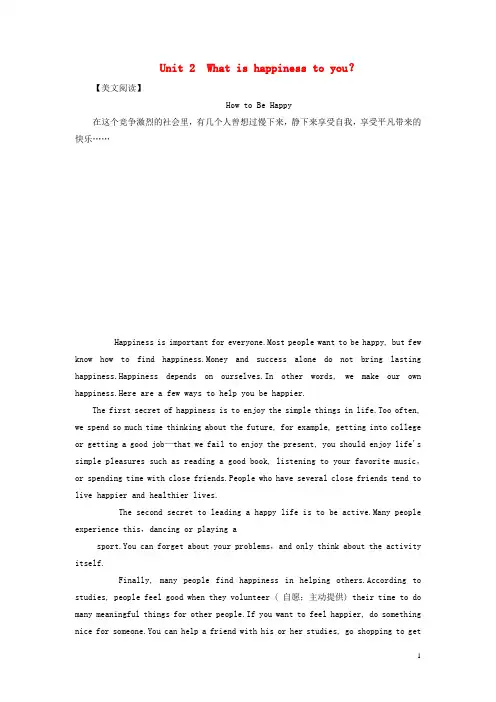
Unit 2 What is happiness to you?【美文阅读】How to Be Happy在这个竞争激烈的社会里,有几个人曾想过慢下来,静下来享受自我,享受平凡带来的快乐……Happiness is important for everyone.Most people want to be happy, but few know how to find happiness.Money and success alone do not bring lasting happiness.Happiness depends on ourselves.In other words, we make our own happiness.Here are a few ways to help you be happier.The first secret of happiness is to enjoy the simple things in life.Too often, we spend so much time thinking about the future, for example, getting into college or getting a good job—that we fail to enjoy the present, you should enjoy life's simple pleasures such as reading a good book, listening to your favorite music,or spending time with close friends.People who have several close friends tend to live happier and healthier lives.The second secret to leading a happy life is to be active.Many people experience this,dancing or playing asport.You can forget about your problems,and only think about the activity itself.Finally, many people find happiness in helping others.According to studies, people feel good when they volunteer ( 自愿;主动提供) their time to do many meaningful things for other people.If you want to feel happier, do something nice for someone.You can help a friend with his or her studies, go shopping to getfood for an old neighbor, or simply help out around the house by washing the dishes.【诱思导学】1.How many ways are you given to be happier in the above passage? And what are they?2. Do you agree with “people can find happiness in helping others”?【答案】 1.Three.To enjoy the simple things in life; to be active;to find happiness in helping others.2.Yes.Helping others is also a pleasure for me, and I'm always willing to help others.Period ⅠPreviewing(教师用书独具)●教学目标本课时主要是通过学生对学案所给出的内容的学习,了解本课文中所出现的词汇,初步了解课文以及相关的背景知识,为下一堂课对课文的全面理解起到一个铺垫作用。

Unit 2 What is happiness to you?eadingTeaching goals 教学目标1. Target language 目标语言a. 重点词汇和短语throughout the wor ld, broom, legally, ceremony, bride, groom, religious, path, be sent to, cruel, individual, fall in love, make arrangements, disturb, attic, propose to sbb. 重点句式It is interesting to note that African slaves who were brought to the USA started this tradition.African American couples were not allowed to legally marry so instead they had a ceremony where the bride and groom jumped over a broom “into marriage”.Then on Saturday, there is a religious ceremony in a church, followed by another party when the bride and groom celebrate the wedding with friends and relatives again.Jane is still not completely happy because she realizes that women do not have the freedom to choose what they want to do — she has become a teacher because she has no other choice.2. Ability goals 能力目标Enable the students to ta lk about different wedding customs in different countries and learn the brief introduction of Jane Eyre’s life.3. Learning ability goals 学能目标Help the students learn how to talk more about happiness.Teaching important and difficult points 教学重难点Get the main idea of the texts and answer the questions about each text.Teaching methods 教学方法Skimming and scanning, asking-answering activity.Teaching aids 教具准备A recorder, a projector, and some slides.Teaching procedure && ways 教学过程与方式Step ⅠRevisionT: In the last period, we learned about two attitudes towards happiness. Do you still remember the two texts? What do they tell about? Who can briefly tell us the summaries of them?S: The first one is about an old man’s opinion about happiness. He thinks the golden days at school we re the happiest of his life. Because at that time, he didn’t have any worries in life. He may play freely with his friends and spend a few hours studying. He needn’t think about problems at work, or worry about income or how to take care of a family. When he was young, he also had good health. That is an important part of happiness. So that was the happiest time in his life.T: Well done. And the next one?S: The second text is about a girl’s opinion about happiness. She thinks her happiness is in the future. Because in the future, new technology will allow people to live longer and be healthier. She also will be successful in her job. People will have learned to fix many of the problems that affect us now. Robots and computers will assist us with the things that are boring. That is why she thinks her happiest days will be in the future.T: Very good! You have done a very good revision. Today we’ll read another two texts. Please open your books to Page 112.Step Ⅱ Lead-in and Fast-reading (Text A)T: We have learned that different people have different opinions about happiness. But I think whether the happiness lies in the past or in the future, there is a time that is the happiest for all. Can you guess when it is?Ss: The wedding time.T: I think so. In a wedding ceremony the bride and the groom are the happiest in the world. Have you ever attended any wedding ceremonies?Ss: Yes!T: Can you tell us something about that?S: In the morning the groom will go to the bride’s to get the bride. Before entering the bride’s, the groom has to knock at the door to beg the relatives of the bride to open the door. And the relatives will ask the groom for some money for fun. The groom can only see his bride by overcoming many difficulties. In the evening, there will be a wedding dinner. Sometimes the couple will be asked to play many games.T: Yes, it is a brief introduction of the wedding custom of Han nationality. Today we will learn about more wedding customs in different countries. Read the passage quickly and then answer the questions:How many wedding customs are mentioned in the text? And what countries do they belong to separately?Get the students to read through the passage.T: Now, time is up. Let’s check the answers. How many wedding customs are mentioned in the text?S: Five wedding customs are mentioned in the text. They are in the USA, in France and Germany, in Greece and Italy, and in England.T: That is the answer. Thank you.Step Ⅲ Careful-reading (Text A)Get the students to understand the passage thoroughly.T: You have done very well. Please read the text again carefully, and then answer the questions below the text. This time I will give you five minutes to read. About five minutes later.T: OK, now let’s check the answers. The first question.S: Jumping over a brush in African-American weddings represents the beginning of family life.T: Good! That is the old tradition for African-American. Today some African-American weddings still include the old tradition. Now next question, who will answer it?S: I will try. In Germany, weddings often last for three days.T: Yes, you are right. Can you explain it in detail?S: OK. On Thursday, there is a simple ceremony at a government office noting the official marriage of the couple. Then the couple will have a dinner with family and close friends. On Friday, there is a wedding-eve party. Then on Saturday, there is a religious ceremony in a church, followed by another party when the bride and groom celebrate the wedding with friends and relative again.T: Very good! And what about the third one?S: In Greece and Italy, people eat special kinds of sweets at the wedding and they also have their own special wedding dances.T: Right! Next question.S: The Russian couples tie a doll to their wedding car if they want to have a daughter. If they want to have a son, they tie a toy bear.T: OK. And the last question.S: The woman who catches the bouquet is supposed to be the next person to get married. T: Good, well done. I believe every one of you have had a better understanding of the text. Right?Ss: Yes!T: Good! Now let’s move to the next text.Step Ⅳ Lead-in (Text B)T: Have you ever read Jane Eyre?S: Yes!T: What’s the end of the story?S: She and her busband lead a happy life.T: So, what qualities do you think help her find the happiness.S: I think it should be diligence. Or we can say hard-working.S: Self-confident.S: Strong-willed.S: Positive no matter how hard the time is.S: Do what she thinks is right.…T: Yes, I think all the qualities are important. Now we will read a book review of Jane Eyre. After numerous difficulties, Jane Eyre won her happiness at last. It is one of the literary classics of the nineteenth century. Do you know the writer of the novel?S: She is Charlotte Bronte.T: You are right. Before reading the text, let’s learn something about the author. Show the students the following introduction:Charlotte is the author of Jane Eyre and a member of the remarkable Bronte family. The sisters Charlotte, Emily and Anne first published their poetry under pseudonyms: Poems by Currer, Ellis and Acton Bell (三姐妹的笔名:柯勒·贝尔、艾利斯·贝尔、阿克顿·贝尔)was released in 1846, selling only a few copies. Charlotte’s novel Jane Eyre was published in 1847, shortly after Emily’s Wuthering Heights; the sisters had almost simultaneously written what later became known as two of the great novels of English literature. Jane Eyre was an immediate success and Charlotte went on to publish Shirley(《雪莉》1848) and Villette(《维莱特》1853). She outlived her sisters but still was only 38 when she died in pregnancy. Charlotte was the only one of the sisters to marry. Her novel The Professor(《教师》1857)was written before Jane Eyre but not published until 1857. As children the three sisters and their brother Branwell dreamed up and wrote intricate histories of the fantasy kingdoms of Angria and Gondal; Legends of Angria, a collection of Charlotte’s childhood writings, was published in 1933.Step Ⅴ Careful-reading (Text B)T: As you have read the novel before, I think it is easy for you to understand the book review. Now I will give you five minutes to read the passage carefully. And then try to answer the questions below the passage.About five minutes later.T: OK, time is up. Let’s check the answers. Who will answer the first question?S: I will. Helen believes that it is better to do without the things you want. But Jane believes that both rich and powerful people and poor people deserve equal human rights.T: Very good. That’s the answer. Next one.S: Jane is still unhappy because she realizes that women do not have the freedom to choose what they want to do —she has become a teacher because she has no other choice.T: Yes, actually at that time, women couldn’t enjoy the equal rights as men. Now the third question.S: Although Jane loves Rochester, she knows since his wife is still alive, it would not be a good idea to stay with him. So she makes the difficult decision to leave him.T: A good answer! Who will answer the next question?S: Jane doesn’t truly love St John Rivers, so she refuses him even though he is a good man.T: Right! Now let’s move to the last question.S: Jane finds happiness in the end by following what she believes is right.T: Good! You all have done a good job.Step Ⅵ Self-assessmentT: In this unit, we have learned a lot, which are all listed on Page 32. Next, let’s do a self-assessment to check if you have mastered all the skills in the unit well. Rank your confidence level.Several minutes laterT: Have you finished? If you are not confident about some of the items listed, please make an action plan after class so that you can improve on them. That’s all for today.Step Ⅶ HomeworkPreview Unit 3.附件Ⅰ. 课文注释与疑难解析1. Technology will guarantee good health and happiness for all.科技将为每个人的健康、幸福提供保障。
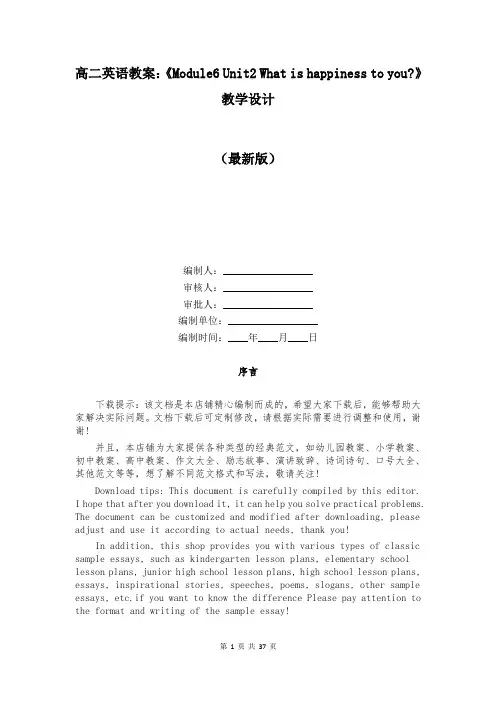
高二英语教案:《Module6 Unit2 What is happiness to you?》教学设计(最新版)编制人:__________________审核人:__________________审批人:__________________编制单位:__________________编制时间:____年____月____日序言下载提示:该文档是本店铺精心编制而成的,希望大家下载后,能够帮助大家解决实际问题。
文档下载后可定制修改,请根据实际需要进行调整和使用,谢谢!并且,本店铺为大家提供各种类型的经典范文,如幼儿园教案、小学教案、初中教案、高中教案、作文大全、励志故事、演讲致辞、诗词诗句、口号大全、其他范文等等,想了解不同范文格式和写法,敬请关注!Download tips: This document is carefully compiled by this editor.I hope that after you download it, it can help you solve practical problems. The document can be customized and modified after downloading, please adjust and use it according to actual needs, thank you!In addition, this shop provides you with various types of classic sample essays, such as kindergarten lesson plans, elementary school lesson plans, junior high school lesson plans, high school lesson plans, essays, inspirational stories, speeches, poems, slogans, other sample essays, etc.if you want to know the difference Please pay attention to the format and writing of the sample essay!高二英语教案:《Module6 Unit2 What is happiness to you?》教学设计高二英语教案:《Module6 Unit2 What is happiness to you?》教学设计高二英语教案:《Module6 Unit2 What is happiness to you?》教学设计Module 6 Unit 2 What is happiness to you? 导学案Reading Period 1(语言感知课)Teaching aims:1.Students can learn some new words and phrases.2. Students can improve the ability of reading by learning another readingstrategy.3.Students can enhance their understanding of “Happiness”.Teaching important points:1. How to make the students have a better comprehension of the passage.2. How to help the students remember the new words and phrases.Teaching difficult points:To help students speak out their opinion of happiness actively.Learning guide:Read , recite and practice .Teaching procedures:Step 1: New words and phrases.一.Words1. 努力,奋斗,挣扎vi.& n. __________2.残疾;无能,无力n.____________3. 仅仅,只不过;简单地 adv. ____________4.积极的,向上的,正面的;肯定的adj._____________5.(使)适应;改编vi.& vt.__________6.乐观的adj.____________7.勇气n.____________ 8.钦佩,羡慕,赞美n._____________9.完成,实现vt.________________ 10.克服,战胜vt.__________________11.严重的;严厉的,严格的adj.___________ 12.鼓舞,激励vt.__________二.Phrases1.楷模,榜样_____________________2. 全世界________________3. 远离,和…不在一起;除了…之外_______________4(使)高兴起来,(使)振作起来_______________5.投身于,献身于________________________6. 住院______________7. 情绪好,精神状态饱满______________________8.在困难时期____________________ 9.在医院___________________10. 使某人失望的是_____________________________Step 2. Lead—inQuestionnaire:1. Do you know Sang Lan?(If not , read the passage on page18.)A. YesB. No.2.After reading the passage ,do you think Sang Lan had hada happy life before she was injured?A. YesB. No.3.Do you think Sang Lan has a happy life now?(Find out the sentences.)___________________________________________________________ ___________________________________________________________ ________Conclusion: What is happiness in your opinion?___________________________________________________________ _________________________________________________________________________Step3 . ReadingGo through the passage as quickly as you can and try to find answers to the three questions in Part A on page 18.(By using the reading strategy.)Step 4. Read again and collect more relevant information in the interview which shows Sang Lan’s personality.Before going to hospital①being successful in her sport when she was young_____________________________________________________________________________________________________________While staying in hospitalbeing in good spirits___________________________________________________________________________________________________________________After leaving hospitalstudying journalism at Beijing University________________________________________________________________________________________ _______________________________________________________________Conclusion: Can you describe what kind of girl she is?(Think of some words to describe her.)___________________________________Step5: DiscussionSang Lan tells people that to be happy, one must keep busy and think aboutpositive things. Do you think this is a good way o f finding happiness?(Discuss with your partner)____________________________________________Step6: RetellingThe search for happinessHost: Dr Brain, welcome to our Talk Show. You are a very famous psychologist who has written several books about happiness and the things people do to keep themselves happy.Dr Brain: Thank you for (1) ______ me. Today, I will take Sang Lan, a former (2)______ in China, for example to talk about how to find happiness.Host: I see. You often use the example to show how peopleget (3) ______ even in difficult time.Dr Brain: Yes, as we all know, she used to be successful in sport but one day got badly (4)______ . As a result, she had to stop her career and sit in armchair all the time. But the whole world can see her (5) ______ cheerful and happy.Host: She must have suffered a lot from her severe injuries and must have been sad.Dr Brain: Though it must have been difficult, yet she was encouraged not only by her parents and friends but also herself. She was always in high (6) ______ after her accident. She took pride in her past and felt happy to be (7) ______ and lucky to learn new things.Host: That must be why her story so special. And how has Sang Lan (8) ______ herself to her new life?Dr Brain: I think it is her strong will and perseverance that work. She says she likes thinking about meaningful things and keeping herself busy to stay (9) ______ and positive.Host: How great she is! I hope all of our viewers can be (10) _______ by her.Step 5当堂检测1.—Is your grandfather__________?------Yes, my father is taking care of him____________.A. in the hospital; in the hospitalB. in hospital; in hospitalC. in the hospital; in hospitalD. in hospital; in the hospital2.---I’ve lost the game again.-----________! It’s not that bad!A. Cheer upB. I’m sorryC. It doesn’t matterD. Oh, my goodness3.-----May I help you?--------No, thanks. I can_______ the difficulty by myself.A. manageB. solveC. dealD. overcome4.You have to change yourself to ______ to the new environment, or you will bekicked out.A. adoptB. adaptC. accustomD. adjust5. They showed great_______ when they found out about their baby’s _______.A. sympathy; disabledB. optimism; disabledC. courage; disabilityD. pride; disability6. The time he has devoted in the past ten years ________ the disabled is nowconsidered _______of great value.A. to help; beingB. to helping; to beC. help; to beD. helping; being7. She _______ those who want to cheer the achievements of women to realizetheir own dreams.A. makesB. demandsC. inspiresD. lets8. Running a company is not________ a matter of hiring people------they alsoneed to be trained.A. simplyB. partlyC. seriouslyD. equally9. Mr. Reed made up his mind to devote all he had to________ some schools for poor children.A. set upB. setting upC. have set upD. having set up10.My grandfather is as ________ as a young man and hates sitting around doing nothing all day.A. enthusiasticB. energeticC. talkativeD. sensitive学习反思:____________________________________________ __________________________________相关推荐高二英语教案:《Unit 6 Mainly revision》教学设计(一)高二英语教案:《Unit 6 Mainly revision》教学设计(一)Teaching aims and demands1.Practise how to solve the problems through the telephone call.2.Learn the langue points in this dialogue.Teaching ProceduresStep 1 Lead --- in1. Show the students a few beautiful key rings (or other things), and then talk with them about their hobbies.T: I have a student whom likes collecting key rings. Once he showed me his rings. That’s a large collection of about one hundred key rings. They are colorful and of different size and shapes. It took him more than three years to have got such a big collection, and he told me hat his hobby did not cost very much. He often tells people about his hobby, so on his birthday he often receives some nice and special key rings as presents from his friends, his parents and relatives.2. Ask the students about their hobbies and then collect their answers.(1) What are your hobbies?(2) Does your hobby take much of your spare time?(3) Do you like collecting thing?(4) Does the collection cost s lot of money?(5) Do your parents have any objection to your hobbies? Why?Step 2 Dialogue PresentationT: Now let’s listen to a dialogue between Bruce and Zhou Lan. They are talking on the telephone about stamps. Listen to it carefully and then you will answer some questions.The first listening:(1) Why does Bruce phone Zhou Lan?(2) Why does Bruce say “ Excuse me” when he phones Zhou Lan?The second listening:Listen and repeat. Ask the students to read the dialogue.Step 3 Language points1. no longer / no more / not any longer / not any more 不再, 再也不--- no more / no longer 放在 be 动词、助动词、情态动词之后,行为动词之前. No more 多用来修饰具体动词;no longer多用来修饰某种具体状态动词.例如:He no longer lived here.He has no more trouble.Bruce works in a company. He is no more a student.--- 表示时间“一度,曾经”,强调以前的情况不再继续下去,once but not now。
高二英语选修6Unit 2 What is happiness to you Teaching objectives:Ss will learn what happiness is like and how to make a happiness handbook.Teaching procedures:Step 1 lead-inPresent some pictures about happiness and tell the students that different people have different ideas of happiness.BrainstormingWhat do you think these pictures are about?What is your opinion of happiness?Step 2 reading(1)Skimming1. What are these two essays about?2. Are both of the writers old or young?(2)ScanningFor the first essay.1. Is the writer an old man? How do you know that?2. Why does the writer think those days were happy?3. What does the writer think young people can do while old people can’t?For the second essay.1.Is the writer a teenager or an adult ? How do you know that?2. Why does the writer think that his or her happiest days will be in the future?3. What does the writer think an adult can do while a teenager can’t ?4. Why does the writer think it is nice to think the happiest days are still ahead of them?Step 3 Group Work(finish project)1.PlanningIn the groups of four, choose a topic for their group’s happiness handbook.(eg.Happiness in the past)2.PreparingTake notes of the story :1.Is it a specific happy event or a general feeling of happiness?2.How long will the essay be?3.Should it be typed or to be handwritten?4.Are illustrations needed in your handbook?3.ProducingEach group member should write an essay.One should check the essay.Another should make the coverAnother will put all the essays together.Another will make the table of contents.4.PresentingPut their handbook up on the display wall of their classroom for everyone to see and let the class vote for their favourite.Step 4 Homework1.Finish the WB exercises2.Revise some language points of this period.3.Finish the Group’s work-----making a happiness handbook.。
Unit 2 What is happiness to you?Part One Teaching DesignAims and requirements♦ Read an interview and two essays about happiness♦ Listen to friend talk about problems and solutions♦ Talk about the gymnast Sang Lan♦ Write an article for a website offering adviceProcedures●Welcome to the UnitStep 1: BrainstormingA f l a s h a p p r e c i a t i o nBoys and girls, good morning (good afternoon). Are you in a good mood today? Let’s enjoy a flash together. What kind of sports can you see in the picture? How do you find the flash?(In the flash, we can see people of different ages take weightlifting exercise and some funny or interesting mistakes or accidents happen during the course of exercise. They make us burst into laughter)Picture-talkingWhat are people doing in each picture? How do they feel? (excited, happy, thrilled) What is the definition of happiness? What are the things that make one happy?Different people have different understanding of happiness. To some people, it means an easy life, a good job, money; to some, it may be helping others, contributions to one’s country......How do you understand happiness? What are your hobbies? And what do you do when you feel unhappy?Step 2: Sharing informationOpen your books to Page 17. Let’s share information about each picture on this page with each other.1. Study the six picturesPicture 1 Being creativeDo you like drawing? When and how did you begin to develop this interest?What does this hobby bring to you? (Whenever I feel upset and want to escape from everything, I like to go into my bedroom and take up my paints and brushes. It's so wonderful--all my thoughts and ideas can be expressed in my pictures.)What other things mean 'being creative' to you? (Thinking of different solutions to solve problems, expressing myself in my own ways and making new things.)Picture 2 Doing exciting thingsWhat are exciting things to you? (like white-water surfing or bungee jumping.) Why do people like exciting things? They bring lots of fun and help people forget all the troubles and worries. Picture 3 ReadingDo you like reading? Does reading make one happy? Why? It is really enjoyable when reading especially in a peaceful and quiet environment. Sometimes we are so absorbed by the characters in the book and their stories that we forget all about the outside world. Through reading, we gain knowledge and our horizons are broadened.Picture 4 Playing sportWhich are your favorable sports? It's a really good way to make friends, keep fit and relax. Picture 5 Spending time with familyDo you enjoy spending time with your family? When you feel happy or unhappy, do you talk to them about your problems and achievements? Family is important to everyone. It's a perfect time to talk to your family about your problems. They can give you good advice and make you confident. They are also happy for the achievements you made.Picture 6 Learning new thingsHave you ever been to a natural history museum? Why do people like museum? In a museum, we can find out more information than we can just through reading books. Visiting these kinds of places can give us a real insight into history.What other ways do you think may help you learn more new things? (Surfing the Internet and talking to different people.)2. Talk about each picture and exchange opinions with your partner.Which things do you often do and like to do? Why do you feel happy when doing these? Step 3: DiscussionWork in groups of 4 to discuss the three questions and then report the answers to the whole class.1. What are things that make everyone happy?There are some things in life that make us feel happy. For example, as a small child, something as simple as getting some sweets is enough to make him or her into a happy child. As a student, passing an exam can make him or her feel on top of the world. For an adult, getting a great new job or traveling to different parts of the world are some of the happiest times.2. What are the things which make you happy?Eating a hearty meal, getting some new clothes, having enough money for something I really want, reading a great book, watching a really good film, making a new friend or making up with my friends after an argument.3. If you had a friend who was unhappy, how would you try to help him or her?In this case, I will try to be a good listener and understand what has made him or her so upset. Offer some advice if necessary. Invite him to go outside for a walk or go shopping together to cheer him upStep 4: HomeworkRead the two articles on P112-113. Prepare the reading part.。
Unit 2 What is happiness to you【导读】《简·爱》(Jane Eyre)是英国女作家夏洛蒂·勃朗特创作的长篇小说,是一部具有自传色彩的作品。
阅读下面选取的有关亲情的节选,对比中外文化中对亲情态度的异同。
Jane Eyre(excerpt)The red roomWe could not go for a walk that afternoon.There was sucha freezing cold wind,and such heavy rain,that we all stayedindoors.I was glad of it.I never liked long walks,especiallyin winter.I used to hate coming home when it was almost dark,with icecold fingers and toes,feeling miserable becauseBessie,the nursemaid,was always scolding me.All the time Iknew I was different from my cousins,Eliza,John and GeorgianaReed.They were taller and stronger than me,and they were loved.These three usually spent their time crying and quarrelling,but today they were sitting quietly around their mother in the sittingroom.I wanted to join the family circle,but Mrs Reed,my aunt,refused,Bessie had complained about me.“No,I'm sorry,Jane.Until I hear from Bessie,or see for myself,that you are really trying to behave better,you cannot be treated as a good,happy child,like my children.”“What does Bessie say I have done?” I asked.“Jane,it is not polite to question me in that way.If you cannot speak pleasantly,be quiet.”I crept out of the sittingroom and into the small room next door,where I chosea book full of pictures from the bookcase.I climbed on to the window—seat and drew the curtains,so that I was completely hidden.I sat there for a while.Sometimes I looked out of the window at the grey November afternoon,and saw the rain pouring down on the leafless garden.But most of the time I studied the book and stared,fascinated,at the pictures.Lost in the world of imagination,I forgot my sad,lonely existence for a while,and was happy,I was only afraid that my secret hidingplace might be discovered.Suddenly the door of the room opened.John Reed rushed in.“Where are you,rat?” he shouted.He did not see me behind the curtain.“Eliza! Georgiana! Jane isn't here! Tell Mamma she's run out into the rain—what a bad animal she is!”“How lucky I drew the curtain,” I thought.He would never have found me,because he was not very intelligent.But Eliza guessed at once where I was.“She's in the windowseat,John,” she called from the sittingroom.So I came out immediately,as I did not want him to pull me out.“What do you want?” I asked him.“Say,‘What do you want,Master Reed’,” he answered,sitting in an armchair.“I want you to come h ere.”John Reed was fourteen and I was only ten.He was large and rather fat.He usually ate too much at meals,which made him ill.He should have been at boarding school,but his mother,who loved him very much,had brought him home for a month or two,because she thought his health was delicate.John did not love his mother or his sister,and he hated me.He bullied and punished me,not two or three times a week,not once or twice a day,but all the time.My whole body trembled when he came near.Sometimes he hit me,sometimes he just threatened me,and I lived in terrible fear of him.I had no idea about how to stop him.The servants did not want to offend their young master,and Mrs Reed could see no fault in her dear boy.So I obeyed John's order and approached his armchair,thinking how very ugly his face was.Perhaps he understood what I was thinking,for he hit me hard on the face.“That is for your rudeness to Mamma just now,” he said,“and for your wickedness in hiding,and for looking at me like that,you rat!” I was so used to his bullying that I never thought of hitting him back.“What were you doing behind that curtain?” he asked.“I was reading,” I answered.“Show me the book.” I gave it to him.《简·爱》(节选)红房子那天下午,我们不能出去散步。
寒风刺骨,大雨瓢泼,大家都待在家里,我倒是因此感到高兴。
我从来不喜欢走长路,特别是在冬天。
过去我最讨厌回到家时天色已暗,手脚冰凉,女仆贝茜总是训斥我而使我痛苦不堪。
无论何时我都懂得我和我的表兄妹——里德家的伊丽莎、约翰和乔治娜不一样。
他们不仅比我高大、强壮,而且还受宠。
这三个人常常吵闹不休,但今天却和妈妈一起静静地坐在起居室里。
我也想加入他们,可我的舅妈里德太太不允许。
贝茜告了我的状。
“对不起,简。
如果不听到贝茜说或是由我亲眼看到你的确努力要学好,你就不能像我的孩子那样,被当成是快乐的好孩子。
”“贝茜说我干什么了?”我问。
“简,这样问我是不礼貌的。
如果你不能好好讲话,就闭嘴。
”我悄悄退出起居室,走进隔壁的小房间,从书架上选了一本图画书。
我爬上窗台,拉好窗帘,把自己整个藏了起来。
我坐了一会儿,时而望望窗外。
11月的午后天气阴沉,大雨倾泻在秃枝枯叶的花园里。
不过大部分时间,我认真读着书,完全被书中的图画吸引住了。
我沉浸在想象的世界中,暂时忘掉了伤心和孤单,只感到快活。
我唯一担心的就是我的秘密藏身处可能会被发现。
突然,门开了,约翰·里德冲了进来。
“老鼠,你在哪儿?”他叫着,没有看到窗帘后面的我。
“伊丽莎!乔治娜!简不在这儿!告诉妈妈她跑出去淋雨了。
真是个畜生!”“幸好我拉上了窗帘,”我心想。
他永远找不到我,因为他并不聪明。
可是,伊丽莎一下子就猜出了我在哪里。
“约翰,她在窗台上。
”她在起居室喊道。
于是,我赶紧走了出来,因为我不希望他来拽我。
“你想怎样?”我问道。
“说‘里德主人,您想要什么’,”他坐在椅子上说。
“我要你过来。
”约翰·里德已经14岁了,而我只有10岁。
他长得又高又胖,常常狼吞虎咽吃得太多,以致闹病。
他本该上寄宿学校的,可是他妈妈太宠他,把他接回家一两个月,因为她觉得他身体弱。